SUMMER 2005 LEADERSHIP PROGRAM FOR TEACHERS
TEACHER OUTREACH (TORCH) WORKSHOPS
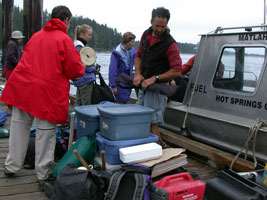
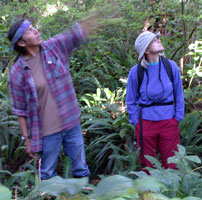
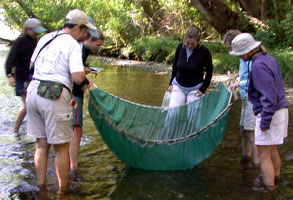
Team loading the water taxi / Traditional knowledge lesson in the rainforest / Assessing salmon streams
"As an Associate Professor of Education at St. Cloud State University, I found the BC TORCH invaluable to myself as a "teacher of teachers," and feel teachers and educators at all levels would benefit through participating in similar experiences. Of particular value to teachers is the manner in which Inquiry Teaching and Learning are emphasized. This emphasis stems from the readings and preparation for the course, but more strongly through the hands-on experiences. For example, our TORCH group participated in a conservation biology research project in collaboration with our First Nations hosts. This project helped solidify the Inquiry approach to teaching and provided a valuable cultural link between our group and our First Nations host family.
Other activities of interest included: learning about how First Nations people utilized their natural resources in a sustainable way, observing the myriad wildlife living close to our camp (wolves, bears, whales & salmon), working with Hesquiaht and Anglo Canadian scientists and educators to learn more about local salmon stream integrity and the inter-tidal ecosystem, and hiking and climbing through the various bio-geological zones of Olympic Peninsula in Washington and the Clayoquot Sound Biosphere Reserve in Canada.
I found the workshop extremely helpful. In my 30 years of teaching and numerous research opportunities it was absolutely the best, most valuable, experience I’ve ever had and the benefit to my students is priceless."
- Professor Gregory Coverdale, St. Cloud State University
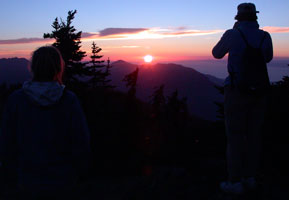
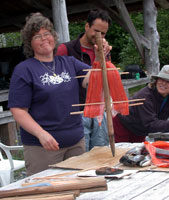

Hurricane Ridge Sunset, Olympic NP / Hesquiaht Karen Charlesen teaching traditional salmon preparation/ Hesquiaht Elder Steven Charlesen teaching Traditional Ecological Knowledge in the rainforest
Session 1: June 4-9, 2005.
Participant Fee: $1100 plus airfare to Victoria rendezvous. (Partial need-based fellowship may be available).
Credits: 2.5 graduate-level relicensure hours credits available through Colorado School of Mines (additional $105 fee). 2 sciences graduate credits available through New Mexico Institute of Mining & Technology ($360 fee).
Facilitators:
Steven & Karen Charlesen, Hooksum Outdoor School, Hesquiaht Harbor, Clayoquot Sound, B.C.
Sennen Charlesen, Victoria, B.C., Canada
Dennis Morgan, M.Sc., Bamfield, B.C., Canada
Sarah Tyne, M.Sc., Bamfield, B.C., Canada
David Scott Silverberg, Ph.D., Environmental Learning Institute, AZ, silverberg@alum.mit.edu
In this TORCH we will explore through authentic inquiry-based learning-research activities the incredible coastal temperate rain forests of British Columbia Vancouver Island's "Wild West Coast". July is usually a time of beautiful weather, frequently clear skies. The Clayoquot Sound Biosphere Reserve is composed of the largest intact virgin rainforest in southern British Columbia, inland seaways, fiords and an incredibly rich marine environment. Towering cedar trees, several salmon species, wolves, bears, eagles, grey, humpback and orca whales typify the region. Experimental logging defined by some as sustainable practices are being employed in the area now. We will visit with the First Nations and Anglo-Canadian communities whose lives are fundamentally dependent on the sustainable management of the regions still relatively intact watershed. Our course partners with Hesquiaht First Nations and NGO's in Clayoquot Sound. We will be tent-camping and staying in a traditional Nuu-Chah-Nulth Hesquiaht Longhouse. At the longhouse we will be hosted by the Charelsen family of Hesquiaht First Nations. Our days are filled with field work, our evenings include lively powerpoint lectures, films, seminars, text-based discussions of inquiry-based scientific learning, traditional ecological knowledge, expeditionary learning, team development models, global environmental change.
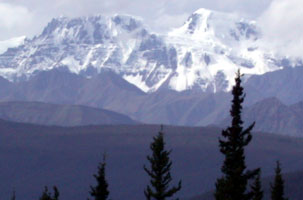
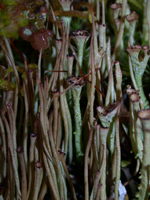
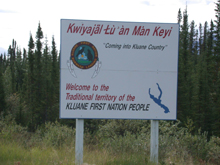
Session 2: August 15 -22 , 2005
Participant Fee: A comprehensive course fee of $1100. Rolling Admissions. $150 non-refundable deposit
Facilitators:
Sennen Charlesen, Victoria, B.C., Canada
David Scott Silverberg, Ph.D., Environmental Learning Institute, AZ, silverberg@alum.mit.edu
and numerous other local area experts.
The Alaska-Canada Highway traverses the remarkable boreal or taiga forests, temperate evergreen forests and tundra environments of the northern North American Cordillerra. It is connector between North America's far northwest and the US Pacific northwest, while also an important corridor for Canadian and First Nations travel and commerce. The entire length we travel straddles the Western Cordillerra mountain ranges, range after range after range, with abundant wildlife, magnificent forests and wild rivers. Heading east and south from Fairbanks Alaska we will visit the tatlin National Wildlife Refuge, the Kluane National Park and Reserve, the Arctic Research Institute, and many of the remarkable Canadian and First Nation's protected areas along the ALCAN and its spectacular "spur" the Cassiar Highway.
Teachers will:
- Study and work with First Nations, and begin an understanding of First Nation's inquiry processes and traditional ecological knowledge.
- Learn about the climate, flora, fauna, and geology of this section of the North American Cordillerra..
- Become familiar with global and local threats to these ecosystems.
- Learn the numerous systems of field journaling.
- Learn a variety of field research techniques that can be applied in the classroom as well as in the field with their students.
- Experience inquiry-based learning first-hand and develop inquiry-based lessons for their own classrooms.
- co-design and co-implement a Participatory Action Research project (with geological and biological components) serving the interests of a local First Nations community.
- Be encouraged to establish long-term professional connections with each other and local experts.
- Participate in professional forums on inquiry-based science, alternative assessment, and constructivist pedagogy in the science classroom.
- Contribute to the creation of a world wide web site that will illustrate the philosophy, pedagogy and experiences of the workshop.